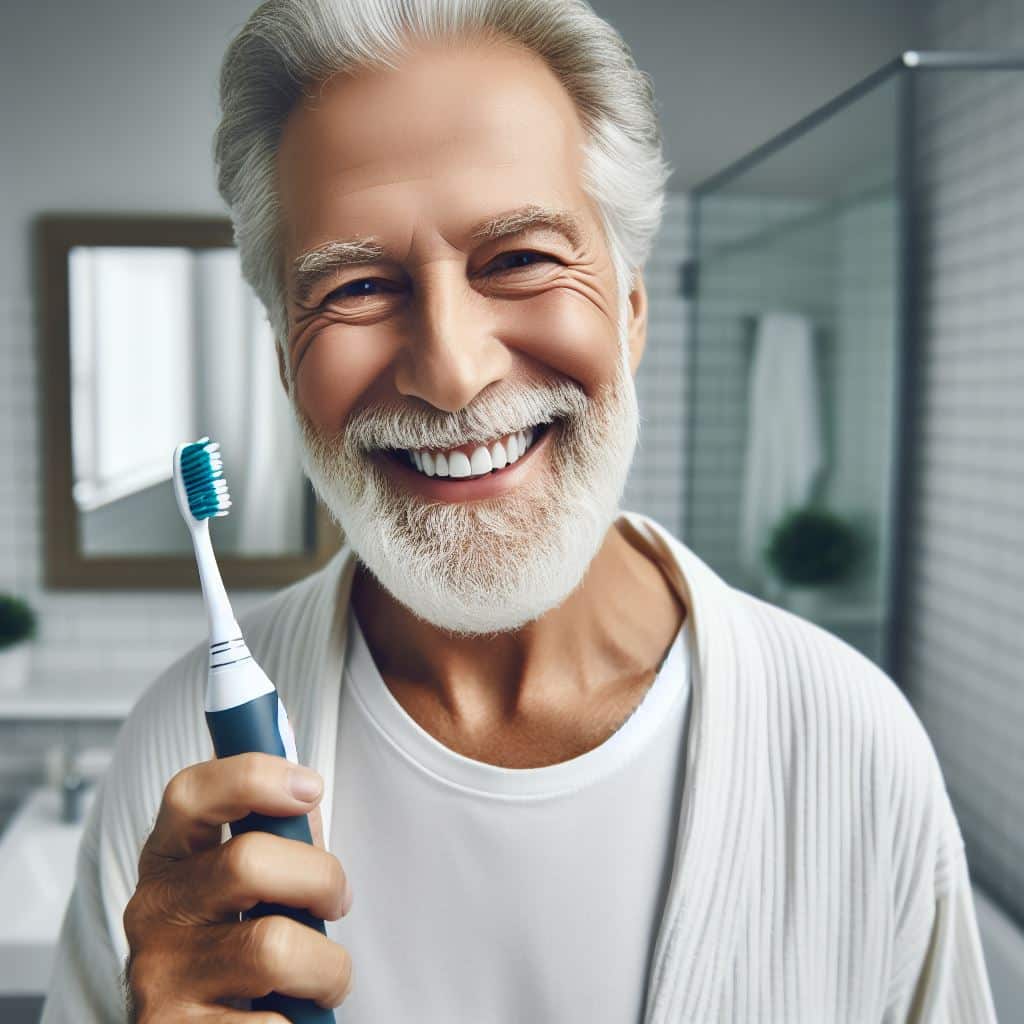- 1. Understanding the Need for Specialized Oral Care in Seniors
- 2. 5 Essential Tools for Senior Dental Care
- 3. Ergonomic Toothbrushes: Designed for Ease and Efficiency
- 4. High-Tech Electric Toothbrushes and Water Flossers
- 5. Specialized Toothpastes and Mouthwashes
- 6. Innovative Products for Senior Oral Health: Key Takeaways
- 7. Innovative Products for Senior Oral Health: Your FAQs Answered
As we age, maintaining oral health becomes increasingly critical, yet more challenging. Many seniors find that their dental care needs evolve, often due to factors such as decreased saliva production, receding gums, and increased susceptibility to diseases like periodontitis. Fortunately, technological advancements and innovative products are continually being developed to enhance comfort and effectiveness in senior oral care. These innovations not only promise improved dental health but also a better quality of life.
Understanding the Need for Specialized Oral Care in Seniors
The need for specialized oral care products for seniors cannot be overstated. As we age, the mouth undergoes numerous changes. Teeth wear down, gums retract, and the mouth becomes dryer, which can lead to increased decay and sensitivity. Additionally, many seniors take medications that exacerbate these issues, making effective oral care even more essential. It is crucial to address these challenges proactively to maintain not only oral health but overall health, as the two are inextricably linked.
Innovative products tailored for senior oral health are designed to address these specific challenges. They often incorporate ergonomic features for easier handling, enhanced cleaning capabilities to combat the effects of reduced saliva, and gentle formulations that are kind to sensitive oral tissues.
5 Essential Tools for Senior Dental Care
As seniors seek to maintain and enhance their oral health, certain products stand out for their innovative features designed specifically for older adults. Here’s a detailed review of the essential tools for senior dental care, outlining both the advantages and potential drawbacks of each.
1. Oral-B Pro 1000 Electric Toothbrush
Pros:
- Pressure Sensor: Prevents users from brushing too hard, which is beneficial for seniors with sensitive gums.
- Daily Clean Mode: Provides an effective cleaning experience optimized for daily usage.
Cons:
- Single Mode: Lacks the variety of modes found in more advanced models which may be required for specific dental needs.
- Battery Life: Needs frequent recharging compared to newer models.
2. Waterpik Aquarius Water Flosser
Pros:
- Customizable: Offers multiple pressure settings to suit varying levels of sensitivity and dental needs.
- Effective Cleaning: Clinically proven to be more effective than traditional floss for reducing plaque, gingivitis, and gum disease.
Cons:
- Size: Bulkier than other models, requiring more counter space.
- Noise: Can be relatively loud during operation.
3. Sensodyne Pronamel Gentle Whitening Toothpaste
Pros:
- Enamel Protection: Specially formulated to strengthen and protect enamel from further damage.
- Whitening: Helps remove stains for a whiter smile without harsh abrasives that can wear down enamel.
Cons:
- Fluoride Content: While beneficial for many, some users prefer toothpaste without fluoride due to personal health concerns or preferences.
- Taste: Some users may find the flavor less pleasant than other variants.
4. Biotène Fresh Mint Moisturizing Mouth Spray
Pros:
- Immediate Relief: Provides instant moisture for dry mouth, which is a common issue among seniors.
- Convenient: Portable and easy to use, perfect for on-the-go moisture.
Cons:
- Short-term Solution: Needs to be used multiple times throughout the day for continued effect.
- Taste: Some users may not prefer the mint flavor, finding it too strong or artificial.
5. TePe GOOD™ Regular Soft Toothbrush
Pros:
- Eco-friendly: Made from bio-based plastic, it’s an excellent choice for environmentally conscious consumers.
- Gentle Bristles: Soft bristles are gentle on sensitive gums and reduce the risk of irritation.
Cons:
- Availability: May not be as widely available in stores as other brands.
- Handle Design: Some users may find the handle less comfortable compared to more ergonomically designed options.
Each of these products offers unique benefits tailored to the specific needs of seniors. However, understanding their potential limitations is crucial for making an informed decision that aligns with individual health requirements and lifestyle preferences.
Ergonomic Toothbrushes: Designed for Ease and Efficiency
One of the most significant advancements in senior oral care is the development of ergonomic toothbrushes. These toothbrushes are specifically designed with larger, non-slip handles to accommodate those who may suffer from arthritis or have limited manual dexterity. The bristle design is typically softer and tailored to be gentle on the gums while effectively cleaning the tooth surfaces.
The increased handle size of these toothbrushes makes it easier for seniors to grip and maneuver, providing a comfortable hold that reduces strain on the hands and wrists. This design consideration is crucial for those with conditions like arthritis, which can make holding and using a standard toothbrush challenging and painful.
The soft bristle design is another critical feature, specifically engineered to prevent irritation of sensitive gums and to avoid exacerbating existing gum recession. Soft bristles bend more easily to apply gentle pressure on the gums and teeth, cleaning effectively without the harshness that can lead to discomfort and potential damage.
Additionally, the angled head of many ergonomic toothbrushes allows for better reach to all areas of the mouth, which is an essential feature for those with mobility issues. This angled design helps in targeting hard-to-reach places, ensuring a comprehensive clean that traditional straight-headed toothbrushes might miss.
| Product Type | Product Name | Main Function | Key Benefits | Rating |
|---|---|---|---|---|
| Electric Toothbrush | Oral-B Pro 1000 | Effective daily cleaning | Pressure sensor, daily clean mode | ★★★★☆ |
| Water Flosser | Waterpik Aquarius | Interdental cleaning | Customizable pressure settings, effective cleaning | ★★★★½ |
| Fluoride Toothpaste | Sensodyne Pronamel Gentle Whitening | Protects enamel, whitens teeth | Enamel protection, gentle whitening | ★★★★☆ |
| Mouth Spray | Biotène Fresh Mint Moisturizing Mouth Spray | Moisturizes dry mouth | Instant relief, portable | ★★★☆☆ |
| Manual Toothbrush | TePe GOOD™ Regular Soft Toothbrush | Gentle cleaning | Eco-friendly, gentle on gums | ★★★★☆ |
High-Tech Electric Toothbrushes and Water Flossers
The introduction of electric toothbrushes and water flossers has transformed oral care, bringing a wave of innovation that benefits all ages, especially seniors. These devices are especially advantageous for those who find traditional brushing and flossing to be challenging or cumbersome.
Electric toothbrushes are designed with multiple cleaning modes, which allow users to customize their brushing experience to address specific oral health needs, such as sensitivity or gum care. This feature is particularly beneficial for seniors who may experience discomfort with standard toothbrushes due to sensitive teeth and gums. The varying intensity levels can be adjusted to provide a comfortable yet effective cleaning that protects the enamel and gums from excessive pressure.
The ease of use offered by these devices is a significant factor in helping seniors maintain their independence in daily oral care routines. Electric toothbrushes typically feature large, ergonomically designed handles and simple controls that are easy to operate, even for those with limited hand mobility or strength. This ease of use ensures that seniors can perform thorough oral cleaning without assistance, fostering self-sufficiency and confidence.
Water flossers complement electric toothbrushes by providing a gentle yet thorough cleaning between the teeth and along the gumline. These devices use a stream of pulsating water to remove plaque and food particles from areas that are often missed by traditional brushing and hard-to-use dental floss. The water flosser’s ability to adjust pressure settings also makes it ideal for seniors, as it can be tailored to be gentle on sensitive gums while still being highly effective at plaque removal.
The combination of effective plaque removal capabilities in both electric toothbrushes and water flossers significantly reduces the risk of periodontal diseases.
Specialized Toothpastes and Mouthwashes
As individuals age, the oral cavity becomes increasingly vulnerable to decay and disease, making the formulation of toothpaste and mouthwash more critical than ever. Many modern oral care products are specially formulated to meet the needs of those with sensitive or receding gums and to be gentle on the oral environment, which is crucial for maintaining dental health in older adults.
Fluoride-Enriched Formulas play a pivotal role in senior oral care by helping to strengthen tooth enamel, which is the first line of defense against cavities and decay. Fluoride helps remineralize the enamel layer, repairing minor tooth decay before it becomes more severe. This ingredient is vital for seniors, as it combats the effects of years of dietary acids and wear, which often accumulate over a lifetime, leading to weakened enamel.
Alcohol-Free Mouthwashes are essential for seniors, particularly those who suffer from xerostomia, commonly known as dry mouth, a frequent side effect of many medications taken by the elderly. Alcohol in mouthwashes can exacerbate this condition by further drying out the mouth. Alcohol-free formulas provide the necessary oral hygiene benefits—like reducing bacteria and freshening breath—without the adverse effect of drying out the oral mucosa, thus maintaining comfort and oral health.
Antimicrobial Ingredients in toothpaste and mouthwashes are crucial for controlling the bacteria that cause plaque and gum disease. As gum tissue recedes with age, more of the tooth surface and root become exposed, and more prone to bacterial colonization. Ingredients such as triclosan and essential oils have antimicrobial properties that help reduce plaque buildup and prevent gingivitis, which if left untreated, can lead to more severe periodontal diseases.
Innovative Products for Senior Oral Health: Key Takeaways
The Gentle Touch Solution
Embracing tools like ergonomic toothbrushes and electric toothbrushes with soft bristles is more than a minor adjustment—it’s a transformative approach to daily oral care for seniors. These tools are designed to maximize comfort and minimize effort, which is especially beneficial for those with limited dexterity or sensitive gums. By making the routine less of a chore and more of a comforting ritual, these innovative toothbrushes can greatly enhance the effectiveness of daily oral hygiene practices, ensuring thorough cleaning without discomfort.
The Hydration Helper
The struggle against dry mouth, a common issue among seniors, particularly those on multiple medications, can be effectively managed with innovative alcohol-free and moisturizing mouthwashes. These products are specifically formulated to add moisture rather than strip it away, maintaining a critical oral moisture balance that is vital for preventing decay and reducing discomfort. By regularly using these specialized mouthwashes, seniors can help protect their mouths from the drying effects of medication and aging, thereby preventing the complications associated with dry mouth.
The Plaque Defense Strategy
The introduction of high-tech cleaning devices like water flossers into a senior’s oral hygiene regimen can revolutionize the way they maintain their dental health. These devices provide a gentle yet thorough cleaning of the teeth and gums, reaching areas that traditional brushing and flossing might miss. Water flossers are particularly effective for seniors, offering an easy, efficient, and more comfortable way to dislodge food particles and plaque, thus reducing the risk of periodontal diseases. Their ease of use and high efficiency make them ideal for seniors looking to maintain optimal oral health with minimal hassle.
By integrating these cutting-edge products into their daily routines, seniors can significantly alleviate the challenges posed by age-related changes in their oral health. These innovations offer practical solutions that not only enhance oral hygiene but also empower seniors to maintain their independence and continue enjoying a high quality of life. Adopting these products can transform dental care from a burden into a beneficial, pain-free part of everyday life.
Innovative Products for Senior Oral Health: Your FAQs Answered
What makes ergonomic toothbrushes suitable for seniors?
Ergonomic toothbrushes feature larger, non-slip handles and soft bristles, making them easier for seniors to hold and gentle on sensitive gums, which is crucial for those with arthritis or reduced dexterity.
How do electric toothbrushes benefit senior oral health?
Electric toothbrushes provide multiple cleaning modes, including settings for sensitive teeth and gums, which help effectively remove plaque with less effort required, reducing the risk of gum disease and decay.
Are water flossers more effective than traditional floss for seniors?
Yes, water flossers use a stream of pulsating water to clean between teeth and below the gumline, which can be more effective and less physically demanding than traditional string floss, especially for those with limited hand mobility.
Can seniors with dentures use water flossers?
Absolutely, water flossers are an excellent option for seniors with dentures as they can help clean around the dentures and maintain gum health without the risk of causing damage to the dentures themselves.
What should I look for in a mouthwash for seniors?
Look for alcohol-free mouthwashes with moisturizing properties to help relieve dry mouth, a common issue for seniors, especially those on multiple medications that can reduce saliva flow.
Is sugar-free gum effective in managing dry mouth?
Yes, chewing sugar-free gum stimulates saliva production, which can help manage dry mouth symptoms by keeping the mouth moist and reducing the risk of decay and gum disease.
What are the risks of using ergonomic toothbrushes?
While there are no significant risks, the softer bristles may not clean as vigorously as harder bristles, which some might find less effective at plaque removal.
How often should I replace my electric toothbrush head?
It is recommended to replace the electric toothbrush head every three to four months, or sooner if the bristles are frayed, to ensure optimal cleaning effectiveness.
What is the best way to use a water flosser?
Start with the lowest pressure setting and gradually increase to a comfortable level. Aim the water stream at a 90-degree angle to your gums, and trace along the gumline and between the teeth.
Can the use of specialized toothpaste replace regular dental check-ups?
No, while specialized toothpastes can significantly benefit oral health, they do not replace the need for regular dental check-ups, which are essential for comprehensive care and addressing issues that toothpaste alone cannot resolve.
References
“Oral health and healthy ageing: a scoping review”: This study conducted by Prakash Poudel et al., published in BMC Geriatrics, provides data on the oral health status of older people admitted to institutions or hospitalized for a long period of time.
“Oral and Systemic Health in the Elderly”: This comprehensive review, published in Applied Sciences, presents an update on oral health and systemic health in the elderly.
“Innovations in Oral Health Education and Practice”: This article, published in Taylor & Francis Online, discusses the innovations in oral health education and practice.
“Improving oral health: How industry can help”: This article, published in Nature, discusses the role that industry can continue to play in positively influencing oral health outcomes, both through scientific research as well as partnerships with patients, dental professionals, academia and non-governmental organizations.








